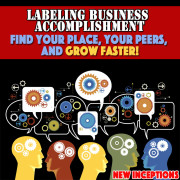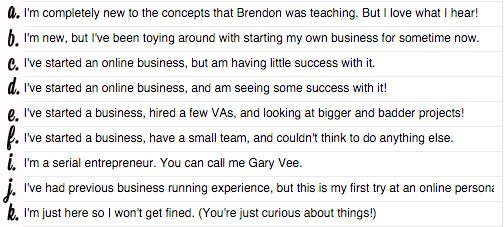Do I Need a Plan B for my Business?
One thing that I notice that people ask their mentors is this simple question: “should I have a plan B in case my business idea doesn’t pan out?”.
And really, it depends on who you ask and what the meaning behind your question is.
As I was doing the research for this piece, the answers I found were all over the board. Some said, “Yes, it’s irresponsible not to have a Plan B.”. While others suggest that you need to burn your bridges. Their thinking is that, like Aeneas of Roman mythology, that there is no going back. Having a plan B means that you have a back door – an escape plan of doing great things.
While I’m a huge believer in being prepared and planning in general (I mean, I’ve been trained to think like an engineer, right?), I think the bridge burners have some points as well.
So which is it?
When President Kennedy wanted to take us to the moon, as impossible as the goal was, we were able to craft a plan to get it done. With a ton of engineering, we were able to accomplish it – even with the primitive computers they had at the time.
However, because they were engineers, they probably had a plan B, C, AND D.
With this in mind, you can see that even the most responsible amongst us are shooting for the stars. However, it might take multiple tries to actually get you there.
Fire and Adjust
This past weekend, I was listening to a podcast in where the host, Michael O’Neal, was talking about branding. One of the ideas that he suggested for starting a new company is to use a name that your audience would know, but not necessarily other people. In this instance, he was talking about a friend of his (or client) who was wanting to start a military based podcast for success. The phase “Fire and Adjust” seemed to fit the bill of veteran entrepreneurs.
When I heard that phrase, it made me think of this Plan B issue again.
In the military, they have an objective. They have overarching goals. However, the tactics that are used to achieve the big picture goal might change depending on the circumstances.
For example, for the Angles of Lattitude Podcast, I originally wanted to have 3 regular hosts that would be discussing topics in entrepreneurship and having guests on. Those three were Brian, Jonathan, and myself.
However, life happened to both of them about the same time. Jon got sucked up by his senior year at college. Brian had a new kid which he now spends part of his days caring for.
So I had to do something quick.
What did I do? Instead of having the same co-hosts every week, I’d have guest co-hosts who were actually past guests themselves. That way, if someone was interested to know more about a particular co-host, they could go back into the archive and find out more about them.
So far, it seems to be working. Which means, I’m still going to have a co-host based podcast, but now it’s almost as if I have multiple guests at the same time – which is something that I don’t hear many podcasts doing. You never know what you’re going to get!
Great story, JC – but how does that apply to me?
Well, in your particular instance, I’m not sure. But there are 4 takeaways that you can get out of it and apply to your own situation.
Commit
This is where the bridge and boat burners got it right. Say what you’re going to do and do what you said you were going to do. Sure, you might not be literally going to the moon on your own, but if you want to build a business that provides for you and your family that utilizes a passion, then you’re going to have to do some work.
If you’re still working a day job, you might not have full-time commitment. However, I’m not saying to quit your job. (In fact, sometimes, quitting your job might have a negative effect on a new business.) When you do have the time to build your dream (which you’ll more than likely have to prioritize to get the time in), you need to have a steady focus and intensity that tells your subconscious that “this is important to me”.
Take Small Steps
One of the things that I’ve noticed many people that I’ve been working with lately start their dream job is that they’re overloading themselves with all the things that need to be done to have a fully functioning online business.
“I need a logo. I need Mailchimp, I need to learn how to put videos on YouTube. I need to learn how to use Snapchat… and… and…”
This is one reason why I highly recommend Fizzle to everyone who starts their first online business. Before Fizzle, I always thought it’d be cool if there was a ONE place where people could go to to get the education to build an online business for a relatively small monthly fee. That’s what Fizzle is. A community built by entrepreneurs for new entrepreneurs to get their business going. Think of it as inexpensive online mentorship.
Anyway, without being in Fizzle, I’d say that you need to build your own Roadmap starting with the end in mind. Ask yourself, what does success look like? Not just when you have a successful business that’s actually in the black, but on the way to that point. Are there examples of businesses that you can model up to the “end point”?
This applies to all of your business, not just the tactics.
When you start seeing results, and you feel confident that going at it 100% of the time will be as rewarding as the day job that you’re in (monetarily and emotionally), then go for it! Plan and execute a transition. Choose a date for your “Freedom Day” – the day that you’re able to pursue your dream full time. Between then and now, research, learn, and build the foundation of your future business. DON’T try to do it all in one month! Hell, it’s taken me a year to get up to this point!!
Network and Leverage Relationships (Like Mad!)
How do I expand my influence?
Read the following in Gary V.’s voice. (He didn’t actually say this… I just imagine he would!)
Meet. New. People.
Why? Because each person you’ve ever met has had an impact in how you think today. Cause and Effect. Where there’s an action, there’s a reaction.
Whether they were a positive influence, or a negative influence, you’ve thought about them for a least a second. If they were a positive influence, you might have thought “How can I use what they said in my life?” If they were negative, you might have thought “Oh, I don’t want to be like them!” or some other type of reaction.
Lack of meeting new people means not only lack of you getting the right influences in your life, but it also means lack of opportunity.
One thing that’s really been making me scratch my head recently is people who must keep their Facebook account limited to real lifefriends. It’s like they’re trying to play golf and going for the lowest score to… I don’t know what the point is. Minimalism perhaps? Trying to keep “positivity” in their feed? Not quite sure.
Here’s the problem with this. They’re not expanding their influence in either direction. They’re not allowing the doors to be open to new opportunities (and in Facebook’s case, new Groups) and they’re not influencing new people.
Think about this. The friends that they have on their account now, were at one time strangers. Even more, those friends probably also have a particular view of this person who’s trying to radically change their life. Chances are pretty low that those friends are going to be going along on the same journey. So, person, who is building influence online… How are you going to build influence online if you don’t and CAN’T even utilize one of the easiest ways to do that?
Pages? Pages can’t network. They can’t get into Groups. They can’t actually build influence. They can keep it going, sure. But when you’re just starting, you need to be shooting for that 5000 max friend score. By then, you might have enough traction for your “Fan Page” to actually have a following.
But using a Fan Page in 2016 to build a following is going to require investing money for advertisements.
If you’re against using Facebook to build your network, there’s other tools that can do that for you. Instagram, Twitter, and what I highly recommend you figure out: Snapchat.
You keep asking questions, we’ll keep answering them. Gary V. out!
Embrace Your Inner Multipotentialite
Don’t fall into the false belief that you have to do just one thing. There used to be a time when you could take advantage of Google and call your website something that people would search. This is where websites like Smart Passive Income originally came from. From there you’d talk about whatever that topic was. That was (and still is) called building a niche site.
However, Google’s changed since then. You can name your business whatever you want. It’s the actions and your engagement that are going to build it.
If Google and the rest of the world is changing all the time, why shouldn’t you?
Not too long ago I talked about the difference between niche marketing and niche product development. This also applies to your career. Just like you can market your business to multiple audiences, you can also do the same for yourself and the dreams and careers you choose. Maybe go-getter millennials don’t pay attention to you. That doesn’t mean that you can’t focus on other audiences and serve them!
Action Steps
So until next time, let’s think about a couple of things here.
Do you need a Plan B? Not if you’re committed to your goal. At this point, as a beginner, just remember that you want to plan a transition to your next career. If you’ve been laid off and thinking that building an online business is quick money, it’s not. Go get a job that complements what you’re wanting to do in the future with this online business.
Now build a roadmap. Having trouble doing that? Not sure what one is? Subscribe to Fizzle and use theirs. Find some people that are on the path to that destination. Add them on Facebook if possible, get to know them a bit.
From there, start working on one thing at a time. Rome wasn’t built in a day!
If you’re not a beginner, how’s your plan going? Did you have to change things up a bit to get to where you are? Would love to hear what caused your plan to change. Also, I’d love to get your feedback my thoughts above!









